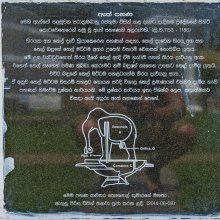Ema, Ēmā: 7 definitions
Introduction:
Ema means something in Hinduism, Sanskrit, Tamil. If you want to know the exact meaning, history, etymology or English translation of this term then check out the descriptions on this page. Add your comment or reference to a book if you want to contribute to this summary article.
Images (photo gallery)
(+9 more images available)
Languages of India and abroad
Sanskrit dictionary
Source: DDSA: The practical Sanskrit-English dictionaryEma (एम).—a. To be obtained.
-maḥ, eman n. Ved. A course, way.
Source: Cologne Digital Sanskrit Dictionaries: Cappeller Sanskrit-English DictionaryEma (एम).—[masculine] eman [neuter] course, way, path.
Source: Cologne Digital Sanskrit Dictionaries: Monier-Williams Sanskrit-English Dictionary1) Ema (एम):—[from etṛ] a am, eman, a, n. course, way, [Ṛg-veda; Vājasaneyi-saṃhitā];
2) [v.s. ...] cf. [Greek] οἶμος, οἴμη [Lithuanian] eisme.
3) b eman See p. 231, col. 3.
[Sanskrit to German]
Sanskrit, also spelled संस्कृतम् (saṃskṛtam), is an ancient language of India commonly seen as the grandmother of the Indo-European language family (even English!). Closely allied with Prakrit and Pali, Sanskrit is more exhaustive in both grammar and terms and has the most extensive collection of literature in the world, greatly surpassing its sister-languages Greek and Latin.
Kannada-English dictionary
Source: Alar: Kannada-English corpusEma (ಎಮ):—[interjection] an interjection used to express appreciation, slight, acceptance, blessing, etc.
--- OR ---
Ema (ಎಮ):—[noun] (correctly, ಯಮ [yama]) (myth.) the Death-God.
Kannada is a Dravidian language (as opposed to the Indo-European language family) mainly spoken in the southwestern region of India.
Tamil dictionary
Source: DDSA: University of Madras: Tamil LexiconĒmā (ஏமா) [ēmāttal] 12 verb probably from ஏமம்¹ [emam¹] + ஆர்¹-. [ar¹-.] intransitive
1. To be protected by, guarded by; அரணாதல். ஏமாப்ப முன்னே யயற்பகை தூண்டிவிடுத்து [aranathal. emappa munne yayarpagai thundividuthu] (பழமொழி [pazhamozhi] 306).
2. To desire;ஆசைப்படுதல். அருந்தேமாந்த நெஞ்சம் [asaippaduthal. arunthemantha nencham] (புறநானூறு [purananuru] 101).
3. To be exhilarated, be overjoyed, be in an ecstasy; to experience the highest delight; இன்புறுதல். காமர்நெஞ்ச மேமாந் துவப்ப [inpuruthal. kamarnencha meman thuvappa] (புறநானூறு [purananuru] 198, 8).
4. To be distressed; கலக்கமுறுதல். புணர்ந்தோர் நெஞ்சேமாப்ப வின்றுயி றுறந்து [kalakkamuruthal. punarnthor nenchemappa vinruyi ruranthu] (பத்துப்பாட்டு: மதுரைக்காஞ்சி [pathuppattu: mathuraikkanchi] 575).
5. To feel proud; to be highly elated; செருக்குறுதல். இரங்கு நமக்கம் பலக் கூத்த னென்றென் றேமாந்திருப்பேனை [serukkuruthal. irangu namakkam palag kutha nenren remanthiruppenai] (திருவாசகம் [thiruvasagam] 21, 7). — transitive To make certain; நிச்சயித்தல். கன வென மருண்ட வென்னெஞ் சேமாப்ப [nichayithal. kananul vena marunda vennegn semappa] (பத்துப்பாட்டு: பொருநராற்றுப்படை [pathuppattu: porunararruppadai] 98).
Tamil is an ancient language of India from the Dravidian family spoken by roughly 250 million people mainly in southern India and Sri Lanka.
See also (Relevant definitions)
Starts with (+62): Ema-tavancam, Emadanyi, Emai, Emai, Emairugi, Emaiya, Emajazua, Emaka iseget, Emakak, Emakanam, Emakaram, Emake, Emakinkaran, Emakutam, Emal, Emaleger, Emaleker, Emaler, Emali, Emalokere.
Ends with (+154): Aczema, Aharema, Akjema, Akshema, Alattibema, Alhucema, Anema, Aninema, Apamema, Apatyaprema, Apriya, Arishtanema, Atiema, Atipreman, Atmakshema, Awe-arema, Ayogakshema, Badema, Bhagavatprema, Bhaktiprema.
Full-text (+10): Hemam, Emapuram, Emaracan, Emankicam, Emaputpi, Atikrisha, Emakinkaran, Emakanam, Emapattiram, Emantupo, Eman, Cinnai, Ema-tavancam, Emal, Emataruman, Ematutan, Emaru, Emakutam, Emarru, Emanakam.
Relevant text
Search found 5 books and stories containing Ema, Aemaa, Ēma, Ēmā, Emaa; (plurals include: Emas, Aemaas, Ēmas, Ēmās, Emaas). You can also click to the full overview containing English textual excerpts. Below are direct links for the most relevant articles:
Guhyagarbha Tantra (with Commentary) (by Gyurme Dorje)
Text 1.16 (Commentary) < [Chapter 1 (text and commentary)]
Chapter 1 - The Introductory Scene < [Chapter 1 (text and commentary)]
Rig Veda (translation and commentary) (by H. H. Wilson)
Women in the Atharva-veda Samhita (by Pranab Jyoti Kalita)
21. Goddessess Sinīvālī, Kuhū, Anumati and Rākā < [Chapter 4 - Female Deities and the Glorification of Women in the Atharvaveda]
Dvisahasri of Tembesvami (Summary and Study) (by Upadhyay Mihirkumar Sudhirbhai)
Biography of H. H. Ṭembesvāmī < [H. H. Ṭembesvāmī: Life, Date & Works]
A fragment of the Babylonian 'Dibbara' epic (by Morris Jastrow)





